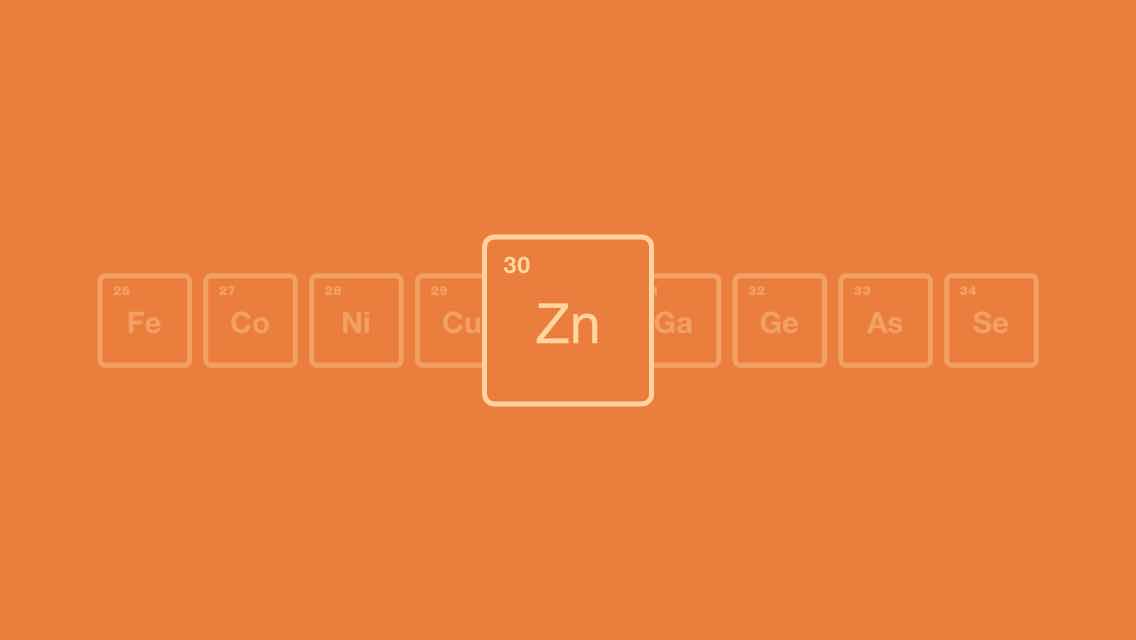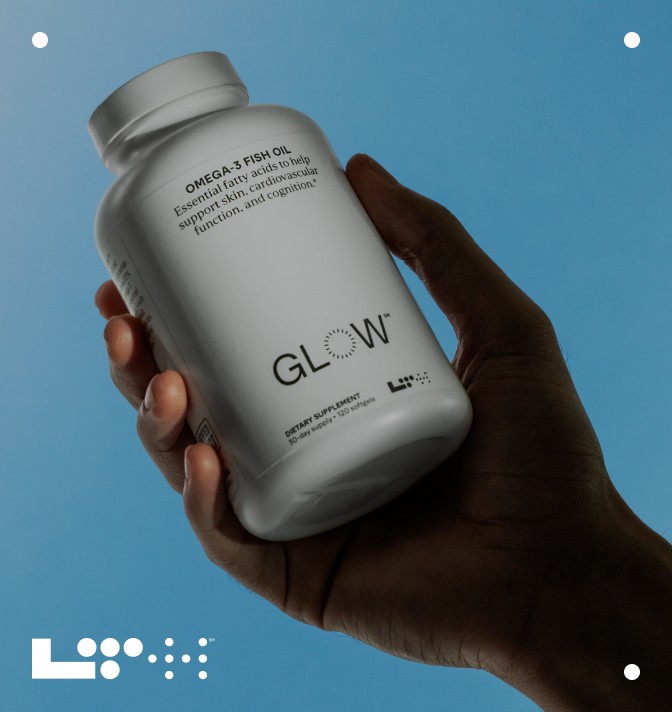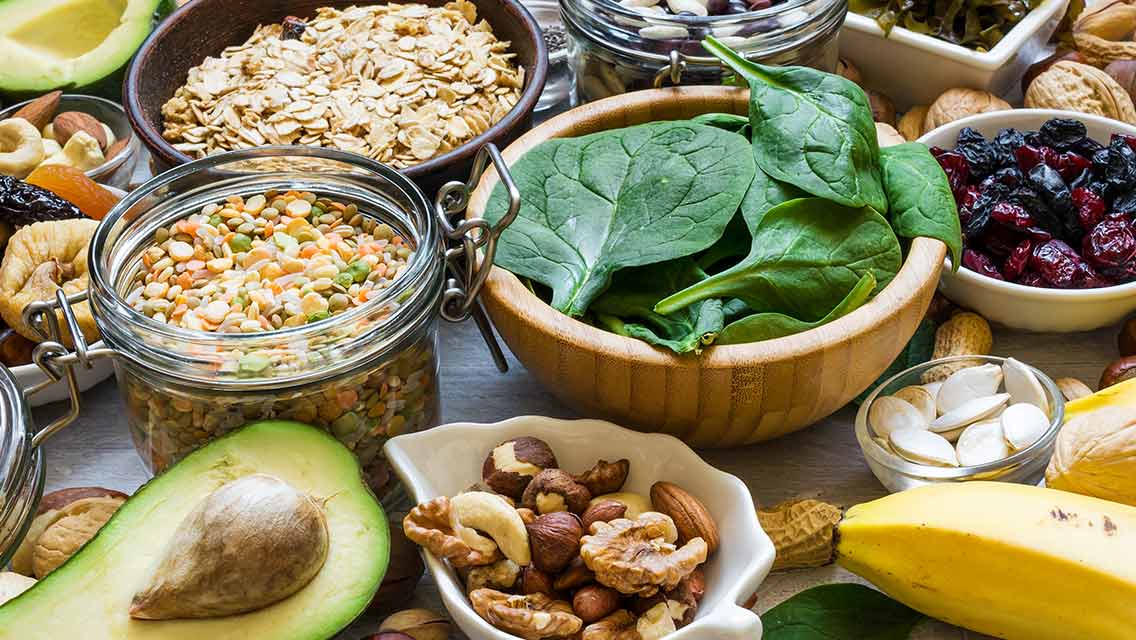From skin complexion and hormone balance to emotional regulation and immunity, the health benefits of zinc are far-reaching. It’s an often underrated champion of trace minerals — and you may be at a higher risk of not getting enough than you might think.
Zinc is considered a trace mineral, or “micromineral.” While we only need tiny amounts of it (relative to some other minerals), those small amounts pack a large punch of power and are non-negotiable if we want our bodies to function well.
Zinc plays a key role in regulating our immune system and supporting wound healing, while its critical role in growth and development in kids is also well established. Its functions extend far beyond those, however. We have more than 200 enzymes that are dependent on zinc. Most of the zinc in our bodies is found in our muscle and bone, with large concentrations also located in our skin, liver, prostate, and eye tissue.
Learn why we recommend that this micromineral be at the top of your priority list to consume, as well as how to optimize your levels.
Low Zinc: Who’s Most at Risk?
If you’re not getting enough zinc, you may experience a wide variety of symptoms. Some of them include:
| Skin issues, including acne, eczema, and psoriasis | Low appetite | Diarrrhea | Patchy hair loss |
| Recurrent infections and colds | Mental health issues | Blood sugar issues | Poor vision, taste, and smell |
| Low testosterone | Poor wound healing | Weakened bones | PMS |
The most concerning part is that many people who are at risk of low zinc might have no idea. Those who could be more at risk include:
- Chronic dieters, or those who restrict calories
- Heavy sweaters, due to the increased loss that occurs
- Those who consume alcohol regularly, since it depletes zinc
- People taking proton pump inhibitors for reflux, such as Nexium, Prilosec, or Prevacid
- Anyone following a vegetarian or vegan nutrition plan, since zinc needs are higher and phytates in beans, grains, nuts, and seeds can limit zinc absorption
- Those who eat a lot of processed foods and cereals containing corn and rice
- Smokers, due to cadmium exposure
- People who might have high copper levels, such as those on birth control or hormone replacement therapy, or those with copper water pipes in their home
- Anyone with a digestive disorder, such as Crohn’s disease or ulcerative colitis
- The elderly, due to both lower intake and absorption
- Pregnant and postpartum women, whose needs might be two-fold higher. Low zinc is tied to both gestational diabetes and pre-eclampsia (dangerously high blood pressure in pregnancy).
9 Health Benefits of Zinc
1. Immune Health
Zinc is involved in both our innate and adaptive immune responses. This means it supports our first-line defenses, as well as our body’s response to specific pathogens, bacteria, and viruses.
Studies have shown that zinc can lower the incidence of infections, and when taken during a cold, it can reduce the number of days you suffer from nasal congestion or a sore throat.
2. Testosterone and Reproductive Health
In men, zinc is important for the function of the testes and the production of hormones — even mild deficiencies can drop testosterone levels. Optimizing zinc can also help with sperm count and male fertility.
Small studies show that when sedentary men start exercising, supplementing with zinc can counteract the initial drops in testosterone and thyroid function that can occur.
Don’t let this preliminary decrease scare you off from starting an exercise program, though: A regular fitness regimen that includes strength training can benefit your health and testosterone levels. It is, however, all the more reason to consider taking a high-quality multivitamin (one that includes zinc), especially when you’re active.
3. Female Hormone Balance
Monthly PMS, cramps, breast tenderness, and mood swings might be common, but they’re not normal. Zinc supplementation could be one part of a nutrition and lifestyle plan to support healthier hormone balance and less discomfort.
It’s speculated that zinc has a role in regulating the inflammatory compounds associated with cramps and could have antioxidant and anti-inflammatory processes in the uterus. One study showed that just three months of regular zinc supplementation could help decrease both physical and psychological PMS symptoms.
4. Lean Muscle
Building and maintaining muscle mass is a key factor in strength, longevity, and blood sugar control. And for those who have a goal to look or feel toned, lean muscle is the key.
Part of the process of building lean muscle includes stimulating a growth hormone called insulin-like growth factor 1, or IGF-1. In one study, when 30 mg of zinc per day was taken in combination with whey protein (full of essential amino acids) for four weeks, IGF-1 rose. The hormone did also rise in those who were taking only whey protein (without added zinc), but the rise in IGF-1 was faster in the group who also supplemented with zinc.
We always support diets that include a balanced intake of calories and mindfulness around “macros” (or macronutrients, including protein, fat, and carbohydrates). However, you need “micros” (or micronutrients, meaning vitamins and minerals, including zinc) for your “macros” to best work.
5. Bone Health
Aging and conditions such as declines in estrogen (which can happen post-menopause), fractures, and diabetes can all threaten bone health. Zinc plays a key role in bone formation and mineralization, meaning it can provide a restorative effect on bone when it’s needed most.
6. Brain Health and Mood
Several parts of the brain, such as the cortex, amygdala, and hippocampus, have nerve cells that depend on zinc. And considering their role in memory, cognition, and mood, it’s critical that zinc levels are adequate.
In animal studies, we’ve seen low zinc status cause depression that is then alleviated with zinc repletion. In a human study of overweight adults with depression, 30 mg of zinc supplementation showed to increase brain-derived neurotrophic factor (BDNF), a protein involved in cognition and emotional health. In yet another human study, zinc in combination with a multivitamin helped reduce anger and depression. Zinc has also shown to have positive implications in those who struggle with OCD.
7. Combats Oxidative Stress
Oxidative stress is when the body’s antioxidant system does not keep up with the production of oxidants, or reactive oxygen species (ROS). While the production of ROS is expected as a product of normal day-to-day functioning and exercise, the balance is thrown off with poor lifestyle choices, in particular, smoking.
Oxidative stress is tied to most chronic diseases, including high blood pressure, heart disease, and diabetes, and is implicated in certain cancers, as well as Alzheimer’s, Parkinson’s, and rheumatoid arthritis. Excess oxidative stress can also accelerate aging.
Zinc has several antioxidant effects. Supplementation can decrease markers of oxidative stress and inflammation, such a C-reactive protein and interleukin-6.
In athletes, where oxidative stress can come from frequent and intense training, zinc has been shown to support levels of glutathione (a powerful antioxidant), activate the antioxidant system, and prevent the negative impact of excess free radicals.
8. Eye Health
Our eye tissue is susceptible to oxidative stress and age-related diseases such as cataracts, glaucoma, and macular degeneration. Since our eye tissues (especially the retina) have a high concentration of zinc, a deficiency can contribute to progression in chronic eye diseases.
Together with omega-3 fatty acids, fat-soluble vitamins (such as vitamin A and vitamin E), vitamin C, zeaxanthin, and lutein, zinc can support healthy eye function.
9. Skin
After muscle and bone, our skin ranks as one of the most zinc-abundant tissues in the body. For those who struggle with chronic skin issues, zinc could play a promising role in the overall treatment plan.
Studies have shown that after six weeks of zinc repletion, the number of acne lesions decreases. And after 90 days of supplementing with 30 mg of zinc, 30 percent of people reported a significant reduction in acne.
Lower zinc levels have also been observed in those who struggle with conditions such as eczema and psoriasis, as compared to those who do not.
How to Optimize Zinc Levels
Mindful nutrition choices can be pivotal in optimization of zinc status. Supplementation can have its place as well, however, it’s important not to over-supplement on high doses of isolated zinc — unless you’re under medical supervision. Your best starting point is a balanced diet rich in food sources of zinc, plus the addition of a high-quality multivitamin.
Food Sources of Zinc
Your zinc status depends on both your intake and your ability to absorb it. Despite its concentration in tissues, zinc is not stored by the body and needs to be ingested daily.
Zinc is more bioavailable (or absorbable) from animal sources than plant sources, likely due to the phytate content in plants which can inhibit absorption. If you’re relying on plant sources of zinc such as beans, nuts, seeds, and grains, soak them in water before cooking and eating them — this helps reduce the phytate content.
Here are some common food sources of zinc:
| Food | Amount | Milligrams of Zinc |
|---|---|---|
| Oysters | 3 | 25 mg |
| Beef chuck roast | 3 oz. | 7 mg |
| Crab | 3 oz. | 4.7 mg |
| Dark turkey meat | 3 oz. | 3.8 mg |
| Lobster | 3 oz. | 3.4 mg |
| Pork | 3 oz. | 2.2 mg |
| Dark meat chicken | 3 oz. | 1.8 mg |
| Cashews | 1 oz. | 1.6 mg |
| Chickpeas | 1/2 cup | 1.3 mg |
| Pumpkin seeds | 1 oz. | 2.2 mg |
| Almonds | 1 oz. | 0.9 mg |
| Baked beans | 1/2 cup | 0.9 mg |
Zinc Supplements
In addition to the phytates often found in plant foods, high amounts of calcium and iron (over 800 mg or so) and low levels of stomach acid can also decrease zinc absorption. Unless directed otherwise by your doctor, take any isolated calcium and iron supplements at a different time of day than zinc, and consider using digestive enzymes at mealtime to support healthy levels of stomach acid.
On the other hand, pairing zinc with protein (except for casein, a milk protein sometimes taken as a powdered supplement) has been shown to support zinc absorption.
There are various forms of supplemental zinc, and the label usually reports the amount of elemental zinc, or the amount used by the body. To support the rate and amount of absorption, you might want to consider a form that is either chelated, such as zinc bislycinate chelate, or bound to picolinic acid, such as zinc picolinate.
Starting with a high-quality multivitamin is probably your best bet before jumping to a long-term isolated zinc supplement. Too much zinc supplementation can cause some digestive upset, and prolonged supplementation of too high of a dose can cause a copper deficiency.
Life Time’s suite of multivitamins each contain a minimum of 30 milligrams of zinc in a bisglyinate chelate form across all three offerings: Multi Performance Complex, AM/PM Women’s Multivitamins, and AM/PM Men’s Multivitamins.
For those who require additional zinc based on lab testing, medical needs, or high risk of deficiency as mentioned above, an isolated chelated zinc is also available in 15-milligram capsules.
In those who are looking to maximize zinc’s impact on the immune system, combining zinc with quercetin phytosome might be helpful. Quercetin is a powerful antioxidant, and evidence suggests that it may help transport zinc into cells to help slow down viral replication.
Read more about quercetin here: “Quercetin: Health Benefits, Sources, Supplements, and Dosages“
As you can see from its many benefits, we consider zinc to be a non-negotiable nutrient to achieve and maintain your health — and unfortunately, there are a lot of potential conditions that can threaten optimal levels.
Be sure you’re paying attention to the foods you’re choosing daily, what you’re pairing them with, and the overall function of your digestive health. Check any supplements you’re taking to make sure the amount of zinc — and the form you’re using — are appropriate for you. Working with your doctor and with a nutrition professional can help you customize your plan so it suits your particular needs.
Zinc might be a micromineral in terms of how much we need, but it has a mighty impact.
References





